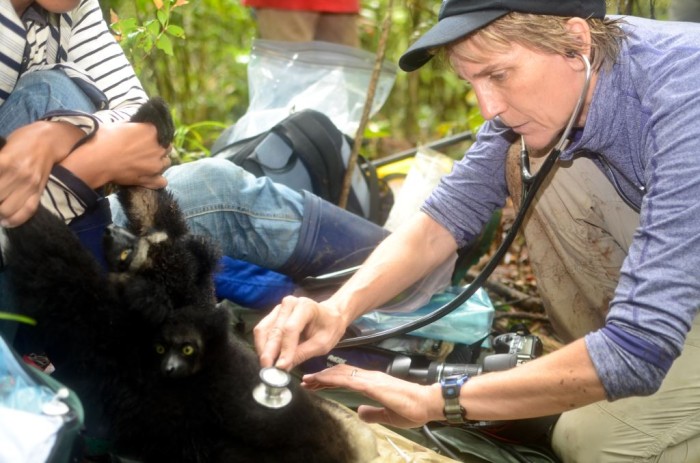Washington University helping to advance One Health movement in region
Initiative links humans, animals, environment to overall well-being
 Courtesy of Saint Louis Zoo
Courtesy of Saint Louis ZooSharon L. Deem, DVM, PhD, director of the Institute for Conservation Medicine at the Saint Louis Zoo, examines a lemur. Zoo and Washington University School of Medicine researchers are collaborating to study viruses in lemurs faced with habitat destruction and extinction.
One Health– a movement aimed at understanding the relationship between human, animal and environmental health — continues to gain traction at Washington University School of Medicine in St. Louis.
On March 3, School of Medicine students officially formed One Health at WUSM, a group committed to a multi-disciplinary approach to medical research and health care that involves physicians, veterinarians and scientists.
And Friday, the Medical Campus will host a seminar on the One Health movement called “The Big Bet: How Linking Human and Veterinary Medicine Improves Health Across Species.” (Click here to register for the event.)
One Health is an initiative to forge such collaborations worldwide; locally, such efforts include the School of Medicine, the Saint Louis Zoo’s Institute for Conservation Medicine, Saint Louis University and the University of Missouri, Columbia.

“This is a burgeoning academic discipline with endless opportunities for Washington University,” said David T. Curiel, MD, PhD, a professor of radiation oncology and cancer biology at the School of Medicine and director of its Biologic Therapeutics Center.
The seminar Friday will be 11:45 a.m. to 12:45 p.m. in the Holden Auditorium at the Farrell Learning and Teaching Center. It will feature overviews and discussions by national leaders of the One Health initiative, including Curiel; F. Matthew Kuhlmann, MD, an instructor in infectious diseases at the School of Medicine; Carolyn J. Henry, DVM, associate dean for research and graduate studies at the University of Missouri College of Veterinary Medicine; Andrew M. Hoffman, DVM, DVSc, director of the Regenerative Medicine Laboratory at Tufts University; and Sharon L. Deem, DVM, PhD, director of the Institute for Conservation Medicine at the Saint Louis Zoo.
The seminar signals the university’s commitment to a growing global effort among physicians, veterinarians and scientists to collaborate on research and education aimed at developing treatments and prevention strategies to improve the interconnected health of humans, animals and the environment, Curiel said.
Along with research partner Jeffrey Bryan, DVM, PhD, an associate professor of oncology at the College of Veterinary Medicine at the University of Missouri, Curiel recently received a $50,000 pilot grant from the Institute of Clinical and Translational Sciences to study canine cancer vaccines. “Cancer in dogs mimics cancer in humans, pointing to the possibility of improved treatment therapies for both species,” Curiel said.
Deem, who is also president of the American College of Zoological Medicine, said the zoo is excited to build One Health’s momentum by partnering with Washington University and other institutions. “I am passionate about the ecological component of One Health,” she said. “We must remember that the reason medicine is so advanced is because of natural resources.”
Among other joint efforts, School of Medicine and zoo researchers are collaborating to study viruses in lemurs faced with habitat destruction and extinction. “The increase in interactions between humans and wildlife can lead to more infectious diseases in both,” said Deem, who has traveled to over 30 countries to research wildlife and human health connections. “As importantly, animals may act as reservoirs or sentinels of diseases for humans.”
Among other upcoming efforts, Washington University medical students will participate in the One Health Fair from 9 a.m. to noon April 16 at the zoo. There, medical and veterinary students and zoo staff — from keepers to zoological managers to veterinarians — will discuss links between wildlife conservation and human health. Presenters will offer information on a variety of animals and a range of diseases that affect both animals and humans.
The School of Medicine also will participate in the Consortium for One Health inaugural symposium Sept. 30 at the zoo. The keynote speaker will be Barbara Natterson-Horowitz, MD, a cardiologist at UCLA who spurred the One Health movement with her 2012 best-selling book, “Zoobiquity: The Astonishing Connection Between Human and Animal Health.”
“One Health provides a powerful paradigm shift that I hope will help address some of the biggest problems of the 21st century,” said Dean Odegard, a first-year medical student who founded Washington University’s student group. “What I love most about it is that collaboration is its core principle. It requires physicians, veterinarians and scientists to work together to solve the global health challenges that we will face in our generation.”
 Courtesy of Saint Louis Zoo
Courtesy of Saint Louis Zoo





